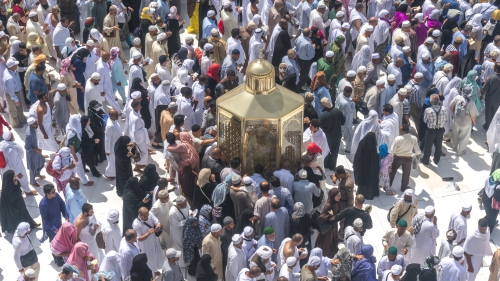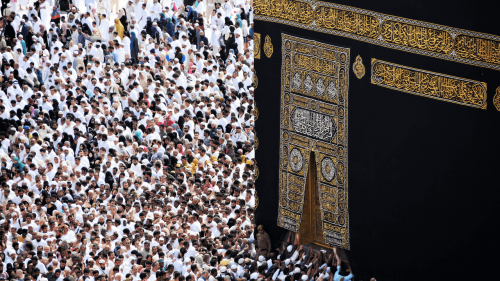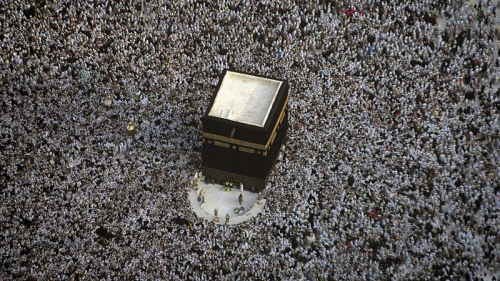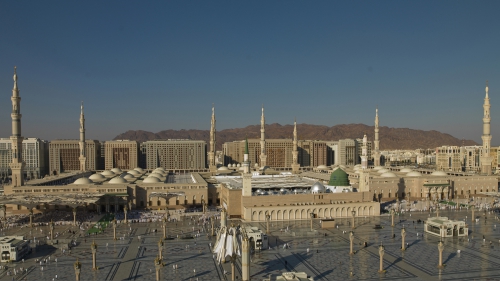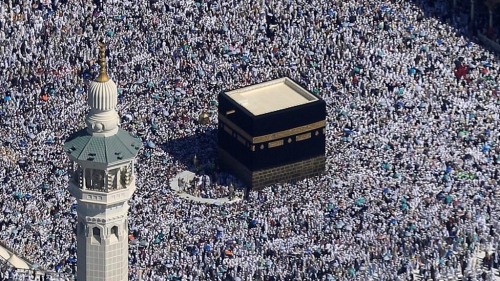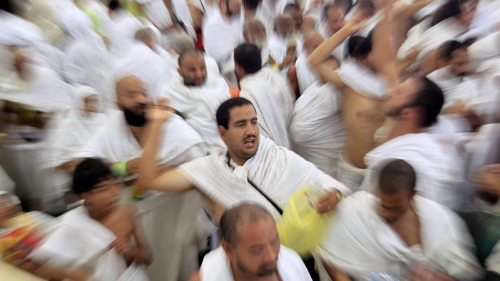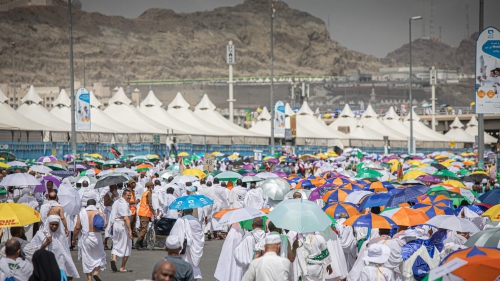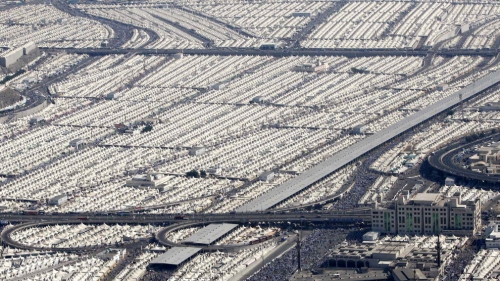The Prophet’s Guidance and Hajj Cancellation

It must have been extremely hard for millions of Muslims from all over the world not to be able to perform firstly ‘Umrah in Ramadan and now Hajj. It had to be heart-wrenching for everyone. This applies to all: intending participants (pilgrims), organizers, hosts, and even those uninvolved worldwide, for cancelling pilgrimage – except for a small group of local residents - and virtually closing down al-Masjid al-Haram and the rest of holy places, is an unimaginable prospect. It is a devastating psychological blow to all Muslims.
The Meaning and Importance of Hajj
Most Muslims live their entire lives for the experience of visiting Makkah – and Madinah –especially as Hajj pilgrims. It is their biggest dream to walk in the footsteps of the prophets (all prophets performed pilgrimage to Makkah), and the footsteps of the most exemplary generations of Islam.
Such signifies the climax of a Muslim’s spiritual journey. It is the conclusion of all of his spiritual cravings and the ultimate end where all other ends lead and eventually come to rest. It is the moment of truth.
No wonder that for Hajj people’s lifelong savings since their youth are set aside. They are also gradually, but persistently, being prepared and primed for the moment, both spiritually and mentally. Many Hajj matters and events have entered the folklore of Muslim communities. Every so often they became the stuff of legend. In the contemporary sense, though, Hajj is increasingly taking centre stage in what could be called a Muslim pop(ular) culture.
All that is more than worthwhile. Hajj is an otherworldly investment whose returns are correspondingly remarkable. Nobody returned from Hajj disappointed, unconvinced, and his expectations not met. There is no better way to self-fulfillment than Hajj. Hajj is a life changing experience. It is a spiritual revolution. After Hajj, nobody’s life is ever the same again. A person must see and experience it to believe it.
Hence, the Prophet (pbuh) emphasized that after an accepted Hajj, a pilgrim will go back free of sin as on the day his mother bore him; that an accepted Hajj brings no reward but Paradise (al-Bukhari; Muslim); and that an accepted Hajj removes poverty and sins as the bellows removes the dross of iron, gold and silver (al-Tirmidhi).
Literally, hajj means “pilgrimage” or “journey to a fixed destination.” It is derived from the verb hajja, which means “to journey” and “to go to.” The verb hajja also means “to intend,” “to aim at” and “to strive for (qasd).” Derived from the same root are the nouns hijjah and hujjah, which mean “year” and “authoritative evidence” respectively.
It follows that Hajj is the pilgrimage (spiritual journey) to the holy city of Makkah: its Ka’bah, al-Masjid al-Haram and the rest of the holy places. It is an extremely challenging occasion conducted once every year (hijjah). The hearts of many people are filled with love towards Hajj, endlessly yearning for and preparing themselves for it (the purity of intention, hajj or qasd).
In Hajj, furthermore, people also seek and find the most authoritative affirmation and evidence as to the meaning of life and truth as a whole (hujjah). He who performs Hajj is called al-haajj. His individuality and integrity are expected to exemplify as much as possible the conspicuous dimensions of Hajj. He himself is to become an evidence and role model.
The Prophet’s Experiences
The Prophet (pbuh) was born in Makkah. The first 13 years of his prophetic mission unfolded there, right in the vicinity of the Ka’bah and its al-Masjid al-Haram. However, ever since he declared his mission, the Prophet (pbuh) was never left alone and in peace. A large number of his countrymen and even his kith and kin rejected him. They never stayed out of his way, making those years the hardest of his life.
Since they knew that purifying al-Masjid al-Haram of its physical and spiritual impurities and making it the epicenter of the Islamic monotheistic message was his supreme goal, the obstinate polytheists of Makkah tried their best to place numerous obstacles in the way of the Prophet’s success. Expectedly, al-Masjid al-Haram, which then housed around 360 idols, was the main focus of their attention.
One can imagine how unnerving it was for the Prophet (pbuh) to see his opponents and the opponents of truth controlling, patronizing, and “maintaining” al-Masjid al-Haram while bearing witness to infidelity against themselves. The Prophet (pbuh) and his followers were hindered from properly utilizing the holy mosque. The mosque was there, but was deformed and blurred. Its innate purpose and functionality were debilitated beyond recognition.
Those obstacles varied from physical to psychological, and from inner bitterness and verbal protests to co-ordinated operations and physical abuse. When the ill-treatment reached its highpoint, and the relationship between the two sides went beyond the point of no return, leaving Makkah and its al-Masjid al-Haram and migrating to Madinah happened next. Such was an unfortunate and sad escalation of events.
It is hard to say which circumstance was more heart-breaking: to continue living in Makkah and next to al-Masjid al-Haram, but experience cruelty and abuse, or to get away and live freely, but away from the best land on earth and its holy mosque.
The Prophet (pbuh) encapsulated this sentiment when he said about Makkah upon leaving it: “You are the most beloved land to Allah, and you are the most beloved land to me. Had the polytheists not forced me out of you, I would never have come out and left you” (al-Tirmidhi; Ahmad; Ibn Hibban).
Then in the 6th year after the Hijrah (migration), despite Makkah still being in the hands of the polytheistic Quraysh, the Prophet (pbuh) decided to go with a group of 1,400 Muslims to perform ‘Umrah (small pilgrimage). However, having arrived at a suburb of Makkah, they were prevented from entering the city and performing the rites of ‘Umrah. They were so near and yet so far. Everybody was devastated, the condition even getting the better of some persons.
As a result, the people were slow in following the Prophet’s order to sacrifice their animals and to shave their heads, even though they did not perform ‘Umrah. The people’s senses – and willingness – were simply for an instant impaired.
The Treaty of Hudaybiyyah was then signed. According to it, the Prophet (pbuh) and Muslims were allowed to perform ‘Umrah the following year and to stay in Makkah only as long as necessary for the small pilgrimage, that is, three days.
And they did so next year, which was the 7th year after the Hijrah. In the 8th year, Makkah was taken over (fath) (in passing, fath is not “conquest”; it literally means “opening a city to Islam”, hence “victory”). Immediately after that, the battle of Hunayn came to pass, following which the Prophet (pbuh) returned to Makkah and performed ‘Umrah. Lastly, in the 10th year, the Prophet (pbuh) performed his farewell pilgrimage, part of which was another ‘Umrah.
All in all, the Prophet (pbuh) performed Hajj once and ‘Umrah four times, taking into consideration also the first obstructed ‘Umrah attempt in the 6th year. Ever since he migrated from Makkah, the Prophet (pbuh) never returned to live there again. His subsequent visits to the city were brief and for some practical purposes.
It is true, as a small digression, that the Prophet (pbuh) for long was divested of many of his rights vis-à-vis the city of Makkah and its al-Masjid al-Haram, but much of that was duly compensated by the advantages entailed in the city of Madinah and its own holy mosque (the Prophet’s mosque), as well as by the essence of the Prophet’s overall heavenly assignments. The Prophet’s main task was to build people (personality and character) and with them the Muslim ummah (community). It was people and their inclusive well-being that mattered. Everything else was put at the service of that magnanimous duty.
The delicate interplay between the two realms is clearly suggested in these words of the Prophet (pbuh). Once while circumambulating the Ka’bah as part of his pilgrimage, captivated by her physical and metaphysical beauty, the Prophet (pbuh) confessed to her: “How good you are; and how good you smell! How great you are; and how great your sanctity is! By Him in Whose Hand is the soul of Muhammad! The sanctity of the faithful believer, in the Sight of Allah, is much greater than yours! i.e., (the sanctity of) his property and blood, and we do not think of him but good.” (Ibn Majah)
On more than a few occasions, the Qur’an registered the Makkan polytheists’ misconduct towards al-Masjid al-Haram, emphasizing their acts of obstructing and debarring people - the Prophet (pbuh) and believers - from it. It says, for instance: “But what plea have they that Allah should not punish them, when they keep out (men) from the Sacred Mosque (al-Masjid al-Haram) - and they are not its guardians? No men can be its guardians except the righteous; but most of them do not understand” (al-Anfal, 34).
“They are the ones who denied revelation and hindered you from the Sacred Mosque (al-Masjid al-Haram) and the sacrificial animals, detained from reaching their place of sacrifice…” (al-Fath, 25).
Lessons Learned
The following are some lessons that could be gleaned from the Prophet’s experiences of being hindered and kept away from al-Masjid al-Haram. The same lessons might be useful in today’s situation when millions of pilgrims are prevented from performing Hajj due to the raging COVID-19 pandemic.
First: dealing with the cause
The Prophet (pbuh) knew that the polytheistic people of Makkah were the only reason why, firstly while in Makkah, he was denied a normal relationship with al-Masjid al-Haram, and secondly after the Hijrah, was deprived of unobstructed access to it. As a consequence, he wanted to solve the problem by directly dealing with them, doing so wisely, patiently, visionarily, and strategically. It is a rule of life that attending to causes is always more productive than attending to effects.
The Prophet (pbuh) did not mix his priorities, nor did he falter in his lengthy pursuit. Everything he did was a premeditated step towards the purification and liberation of the city of Makkah and its holy mosque from the material and spiritual de-filements of the polytheists.
Regardless of how small and inconsequential some procedural matters might have seemed, they occupied a significant place and played a big role in the grand scheme of things. They were part of an all-encompassing strategy. The Prophet’s vision was a divine vision. His methods were inspired and guided by Heaven. Everything was part of Almighty God’s providence and plan for His creation.
Similarly, those who are unable to visit the holy places today and perform their long coveted Hajj, should bear in mind that this, too, is part of the Almighty’s will and plan. All this is happening only because He so wills. Nothing escapes His attention and knowledge. And since God’s actions are always good, beneficial, just, and grounded in His infinite wisdom, there must be also a profound reason behind the COVID-19 pandemic, which in turn led to the cancellation of Hajj. That reason – or reasons – may not be known to us as yet, however, that is where our faith (iman) comes in. We have to fully trust God, our Creator and Master, with our entire lives, letting Him run the show of His creation - including us.
If the Prophet (pbuh) dealt with the forces that prevented him from enjoying al-Masjid al-Haram, people likewise ought to deal as resolutely today with the COVID-19 pandemic which prevented them from undertaking Hajj. It is a big ask, but every individual must play a role. Only when the world stands united, with everyone contributing his share, can the global pandemic be defeated and can the world become a safe place again. The sooner we do that the better, and the sooner will ‘Umrah and Hajj services resume.
People should be steadfast in doing so and feel as though they are men on a mission. As the true servants of God, they should lead by example, seeing their efforts as part of a holy struggle. The pandemic is certainly God’s will, but we will all be held accountable as to how we responded to it.
If nothing, every person can protect himself and others, for example, by living a healthy and hygienic lifestyle, following good respiratory hygiene, maintaining social or physical distancing, avoiding going to crowded places, staying home and even self-isolating whenever necessary, seeking medical attention whenever in doubt, avoiding unnecessary travel, following standard operating procedures under all circumstances, cooperating with authorities, and by constantly educating himself about the issues surrounding the pandemic.
It is undeniable that the Prophet’s situation and our predicament are worlds apart. However, the impact is practically the same: someone (the Makkahns in the Prophet’s context) and something (COVID-19 in our time) isolated (in our time) and manipulated (during the Prophet’s time) al-Masjid al-Haram, and thus obstructed the pilgrimage.
People should remember that whatever good they do, it will not be wasted. It may yet bring them closer to the beloved al-Masjid al-Haram. It is human conscious efforts that count most. Results are in God’s hands.
Second: the physical Ka’bah and the “ka’bahs” of hearts
Like everything else in Islam, there are physical and metaphysical dimensions of Hajj. The first ones are dictated by space and time factors, while the second ones are not. Often, the validity of the former depends on the validity of the latter. Both poles are important for creating a religious synergy; nonetheless, concentrating more on form and quantity will lead basically nowhere, whereas concentrating more on substance and quality will inevitably lead to the mastering of form as well. Sheer quantity and form blind and incapacitate, while quality and substance empower, uplift and open up new vistas.
During the Prophet’s time, the Makkans thought that fervently clinging to the mere appearance and structure of the Ka’bah, and controlling it as such, will sustain their position and their unholy campaigns again Islam and the Prophet (pbuh). They in addition thought that such was a sign of righteousness and virtue.
On the other hand, the Prophet (pbuh) knew how wrong the Makkans were. Their viewpoints were snobbish, hollow, and vain, resting on shaky ground. He understood that for purifying and liberating the Ka’bah, he needed to restore its intrinsic heavenly meaning and worth, and to establish it as such in the heart of each and every Muslim.
But to do so in Makkah, it was impossible. After thirteen years of trying, the city proved unsuitable and barren. The Prophet (pbuh) then moved more than 430 kilometres away from the Ka’bah. Defying conventional logic, in order to rescue the Ka’bah, the Prophet (pbuh) went away from it. He went to a place where he could freely create “ka’bahs” in people’s hearts.
The Prophet (pbuh) knew that the “ka’bahs” of hearts will not rest until they liberated and got unified with the actual Ka’bah. In this manner, nothing could stop the Prophet (pbuh) from victory, sooner rather than later, and no amount of the Makkans’ resistance could stand in the way. As outlandish as it may seem, the Prophet’s position got stronger only because he was physically far from the “distorted and incapacitated” Ka’bah, facing, experiencing and living its true merit from a distance, while the position of the Quraysh got weaker only because they lived next to the Ka’bah and held on to it as a mere structure and a symbol.
For that reason, those who could not perform Hajj this year, even though they planned and made all the necessary preparations, should not despair. Everything is not lost. God knows best, but if anything unfortunate happens and they do not perform Hajj at all, in God’s book they have done so – in sha’ Allah – for deeds are measured according to intentions.
Moreover, people should always work on establishing “ka’bahs” in their hearts. They should carry them inside wherever they go. They should live with them and in accordance with the will of their Lord and the Lord of the Ka’bah (rabb al-ka’bah). Since God is always with them, let the spirit of His Ka’bah (His House, baytullah) be with such people as well. By doing so, a path to the actual Ka’bah will open up when and where they least expected. The two “ka’bahs” will find a way to each other.
Most people who could not make it this year, will eventually go for Hajj. When they do, they should make sure they are more than ready. They can double the experience and reap double rewards simply because they doubled their preparations. They should channel their frustration and sadness towards the prospect of learning more about Hajj and Islam in general. They should equip themselves with additional patience, fortitude and determination. They need to overcome a potential scenario where a pilgrim wishes he knew more and was better prepared so he could gain even more out of the Hajj marvel. People must stay positive about everything, taking everything in their stride. Let the cancellation of Hajj work in their favor.
When they go for Hajj, people have a duty to ensure that they go with “ka’bahs” in their hearts. They must not go to impose themselves upon and dominate anything – apart from their egos and their faults. They should go to Makkah to be overwhelmed and conquered.
People are invited to listen to their “conquered” hearts. They should contrast their smallness with the greatness of the occasion of Hajj and the ideas underpinning it. They should let their experiences waver between losing and, at the same time, finding themselves in the midst of largely inexplicable heavenly signs. Let the actual Ka’bah freely interact with the “ka’bahs” of people’s hearts.
Third: overcoming tests
Life is a test and God tests us in different ways. He does so because He loves us and wants us to move forward. Without tests, life will be a stagnant and boring affair. For example, without tests a student will be stuck in grade one forever. Only owing to various tests and exams – i.e., worries, hard work, and occasional suffering – can a student gradually progress and, in the end, graduate. It is due to these principles that a person can become a somebody in life. Without tests and trials, he will be a nobody. Indeed, adversities make people stronger and more conscious.
People need to make certain that their lives are free from unnecessary ifs and buts. They will be stronger psychologically and even spiritually. They will be better Muslims. They must adopt optimism and shun pessimism. The Prophet (pbuh) advises: “A strong believer is better and is more lovable to Allah than a weak believer, and there is good in everyone, (but) cherish that which gives you benefit (in the Hereafter) and seek help from Allah and do not lose heart, and if anything (in the form of trouble) comes to you, don't say: If I had not done that, it would not have happened so and so, but say: Allah did that what He had ordained to do and your ‘if’ opens the (gate) for the Satan” (Muslim).
It goes without saying that people’s not going for Hajj, despite making up their minds and carrying out all the preparations, is certainly a massive test. To some, it may yet amount to the most difficult situation they have ever found themselves in. The COVID-19 pandemic is a test too. It is an instrument of God’s will and design.
However, there is an extra aspect to Hajj. The Prophet (pbuh) said: “The pilgrims performing Hajj and ‘Umrah are the guests of Allah; if they call upon Him He will answer them, and if they ask Him for forgiveness He will forgive them” (al-Nasa’i).
Therefore, going - or otherwise - for Hajj has something to do with God’s special arrangement for His servants in general and His guests in particular. It includes such as have intended Hajj this year as well. Hence, those people should feel fascinated, yet excited and motivated, that the Lord of the universe intended something big and historic for His creation, integral to which are their beings and their personal cases. In a way, it follows, those people are special.
In such a state of affairs, the affected group must keep communicating with God, calling upon Him and seeking His forgiveness, answers, and future direction. They need to keep in mind that people’s answers and guidance are inconclusive and may yet prove the opposite. God is the most profitable option. They intended and planned, doing their level best, to be of God’s guests this year and so, most honored. If things did not go according to plan, it was not their fault.
Thus, while God reminds all His servants to continuously supplicate to and communicate with Him, those people should go the extra mile, knowing that the all-just God will not let them down. They should feel confident that God will answer their prayers because they are in a disturbed psychological state. They are worried and in distress, a perfect recipe for prayers to be accepted. They need to open their hearts and talk freely whatever they desire to God and in any language they want: “Pray to your Lord humbly and privately” (al-A’raf, 55).
They should intensify their prayers and other forms of worship in particular during the days of Hajj, as such was supposed to be their moment. That will sharpen their focus and boost their spirituality, bringing them ever closer to God, the universe of Hajj, and to themselves. They can have a virtual Hajj in their hearts and minds, making them feel better. They can have private spiritual feasts. They can still make it their moment.
And when the dust settles and those people really go for Hajj one day, they will have an exhilarating feeling of déjà vu, so to speak. They will experience a special bond with everything relatable to Hajj. They will feel that concerning their spiritual development, the sky is the limit. Now on the ground they will feel how much better, more enlightened and more confident they have become. They will thus be able to grasp some wisdom and benefits behind the cancellation of Hajj. With tears in their eyes, they will then thank God most profoundly.
God reveals: “But perhaps you hate a thing and it is good for you; and perhaps you love a thing and it is bad for you. And Allah knows, while you know not” (al-Baqarah, 216).
Topics: Coronavirus, Hajj, Kabah, Pandemic, Taqwa (God Consciousness)
Views: 6102
Related Suggestions







